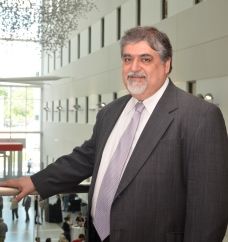
Fil d'Ariane
- Nouvelles et événements
- Nouvelles
- Content
- Message du directeur de l'IR-CUSM
null Message du directeur de l'IR-CUSM
Vassilios Papadopoulos, D.Pharm., Ph. D.

Chers collègues,
Cet automne, nous avons célébré le 50e anniversaire de la découverte de l'antigène carcino-embryonnaire (ACE). En 1965, les docteurs Phil Gold et Sam Freeman ont publié leur travail historique sur l'identification d'un antigène présent à la fois dans le côlon d'un fœtus et dans l'adénocarcinome du côlon, mais ne semblant pas être présent dans le côlon d'adultes en santé. Puisque la protéine ne fut détectée que dans les tissus cancéreux et embryonnaires, on lui a donné le nom d'antigène carcino-embryonnaire, ou ACE.
Cinquante ans après sa détection initiale dans du sérum, l'ACE est un des marqueurs de tumeurs les plus utilisés dans le monde et certainement le plus souvent utilisé dans le cancer colorectal, étant le premier biomarqueur en oncologie approuvé par la Food and Drug Association (FDA).
La découverte de l'ACE fut importante non seulement parce qu'elle a permis de sauver d'innombrables vies, mais aussi parce qu'elle a attiré de nombreux cliniciens et scientifiques à l'Hôpital général de Montréal du Centre universitaire de santé McGill (HGM-CUSM) et à l'Université McGill, faisant de cette dernière le site principal de recherche sur le cancer. Cette contribution a perduré, comme l'a démontré le nombre élevé de cliniciens et de scientifiques qui travaillent dans notre Programme de recherche sur le cancer, ainsi qu'au Centre du cancer des Cèdres et au Centre de recherche sur le cancer Goodman. De plus, ce travail a contribué à la création de l'Institut de recherche de l'Hôpital général de Montréal, qui est la base de ce qui est maintenant l'Institut de recherche du Centre universitaire de santé McGill (IR-CUSM).
Aujourd'hui, notre institut de recherche est prospère. Dans la dernière analyse de Research Infosource (www.researchinfosource.com) sur l'édition 2015 du palmarès des hôpitaux de recherche au Canada, l'IR-CUSM a atteint 190 M$ en activités de recherche, avec une moyenne de 530 000 $ par chercheur à plein temps, malgré les difficultés actuelles dans le secteur du financement. Ce sont les résultats les plus élevés que nous ayons atteints, ce qui démontre l'ampleur de la recherche et des efforts extraordinaires déployés par tous les membres de notre institut. Avec notre nouvelle infrastructure au site Glen, les rénovations au site de recherche de l'HGM-CUSM, et bientôt, je le crois bien, de nouvelles installations pour les membres de notre Centre de recherche évaluative en santé, nous sommes maintenant encore mieux disposés à aborder les problèmes liés aux maladies et à comprendre la santé. Je saisis cette occasion afin de vous informer que notre Centre de médecine innovatrice offre maintenant des services en recherche clinique à l'IR-CUSM.
Bien que nous ayons observé une augmentation dans le financement ces dernières années, je suis conscient que cette situation est éphémère. Notre capacité à maintenir cette hausse en financement sera mise au défi par une baisse continuelle de financement du gouvernement, par des changements dans le financement et dans les processus de révision aux Instituts de recherche en santé du Canada, par des changements dans les secteurs de pharmacie et de biotechnologie, par l'interruption de la recherche provoquée par le déménagement dans nos nouvelles installations au site Glen et les rénovations à l'HGM-CUSM, et par un manque de recrutement de nouveaux professeurs.
Pour l'IR-CUSM, 2015 fut l'année du déménagement et de la réorganisation, l'année où plusieurs enjeux à long terme (p. ex., les postes menant à la permanence) furent abordés et nous avons travaillé fort ensemble pour se préparer aux changements dans notre écosystème de recherche. J'espère qu'en 2016 nous profiterons des possibilités maintenant offertes par nos environnements, nous nous ajusterons à ce nouvel écosystème et que nous triompherons dans nos nouveaux projets. Inspirons-nous de la découverte de l'ACE et offrons au monde de nouveaux exemples de réussites tels que celui-ci qui seront célébrés dans 20, 30 et 50 ans.
Meilleurs vœux pour un merveilleux temps des fêtes.
Vassili